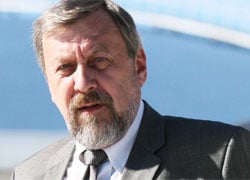Summit in jails of Eastern Partnership
- Andrei Sannikov
- 1.12.2013, 15:38
- 4,090

The Eastern Partnership summit in Vilnius is over. This year it was the main event of Europe’s political life.
It was a good, deep, intriguing, refreshing summit with a decent representation from the EU states.
Unfortunately, Ukraine “stole” the summit. The EU directed all its efforts to convince president Yanukovich to sign the association agreement, as if it would change the authoritarian lurch of the ruling Ukrainian government. There is not much sense in convincing a ruler whose power is based on an authoritarian model that he needs democracy.
Some people explained Ukraine’s sudden rush to the opposite side with Yanukovich’s unwillingness to release Tymoshenko. This analysis is incorrect. The possibility of the agreements being signed without Tymoshenko’s release that's what frightened Yanukovich. Such signals Ukrainian president had been receiving from Europe before the summit. He realized that he cannot use the “Tymoshenko factor” to accuse Europe of trying to sabotage the signing of the agreement that he himself never planned to sign in the first place. Nor does he plan to sign it now.
When afterwards Ukrainians went to the streets all over the country for the Euromaidan, Europe was rescued.
The Ukrainian intrigue dimmed Moldova and Georgia’s signing of the EU agreement on free trade and initialing association agreements. These agreements demonstrate the potential of the EU. The realization of the agreement should be in focus of Europe’s attention. Moreover, these two countries will be inevitably exposed to pressure from Russia, and both of them need support for their territorial integrity.
One shouldn’t measure the summit by failures or success. It should analyzed from the point of view of the current situations of the countries of the Eastern Partnership as well as chances of the EU to affect these situations in order to protect human rights and democracy. These values are the cornerstone of the entire program of the Eastern Partnership, and failure to keep to them always leads to poor results.
The summit in Vilnius has shown that negotiating with authoritarian rulers or dictators is pointless. They will not make even minor move , like formal signing of association agreements, if they sense a threat to their power.
It is unclear why the Russian factor took the EU by surprise. The Kremlin has long ago expressed its attitude to the Eastern Partnership, and it was obvious that its pressure on all six countries would only grow before the Vilnius summit. Mere promises that Eastern Partnership is not against Russia and that it in fact will benefit from it lead nowhere. Serious efforts and programs are needed, but first of all, Europe needs to show solidarity with democratic forces and to protect its values. Europe is capable of this solidarity, which was proved when Europe supported Moldova after Russia had stopped importing Moldavian wines. The EU’s reaction was quick: Europe has discovered the “taste of freedom” and promised to buy Moldavian wines and cognacs.
Eastern Partnership needs to be preserved even if some of the incumbent rulers or dictator Lukashenka wish to leave it. It should be open and strong, and it should give Eastern Europe new windows of opportunity. Polish Foreign Minister Sikorski made a very precise remark at one of the conferences. He said that the Eastern Partnership is the most natural direction for the EU and the only truly European initiative.
Yet there was one obvious failure of the summit and its preparation, an issue perhaps even more important than signing and initialing. Not a single political prisoner has been released: neither victims of the “selective justice” in Ukraine and Georgia, nor political prisoners of Belarus and Azerbaijan. The EU failed to use the time before the summit, when communication with the officials of the Partnership was regular and active, to release people from jails. Moreover, at the summit, Belarus was represented by the official who himself was involved in repressions against the opposition and civil society. Perhaps it was not to offend him that no document regarding the situation with human rights in Belarus was adopted. Meanwhile, two years ago during the summit in Warsaw the EU adopted a declaration of this type. And it would be reasonable at least to mention it, because the situation in Belarus has only worsened, and the number of political prisoners is growing again. Those who are mentioned in the declaration, including presidential candidate Mikalai Statkievich and human rights activist Ales Bialatski, are still behind the bars.
Unfortunately, the topic of human rights was not appropriately raised during the official part of the summit in Vilnius, maybe because of the Ukrainian issue. I do hope though that it didn’t happen because the question of political prisoners had been removed from the agenda, I do hope that there is another reason.
Today the European Union has an opportunity to extend the geography of European values, but for that, the EU should protect these values instead of trying to educate dictators.
Andrei Sannikov, leader of the civil campaign European Belarus, for charter97.org









